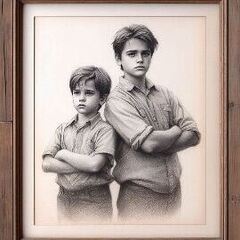A Moment after Church
Autumn 1985
At nineteen, my main mission in life was to “fit in” with the world around me. If I kept my head down and didn’t draw attention to myself then people would not guess my secret and not hate me for it, as I feared. It was a simple but very flawed plan, though at the time it was all I could see to do.
At that time, most of my world revolved around being a member of my church and being a good Christian because that was what was expected of me with my membership there. It was an Evangelical Anglican church, and being Evangelical they preached that the church had to be all of your life, and I happily agreed with that because I so wanted to fit in somewhere. Up until then I had been an outsider in my life; I didn’t like the things other kids were passionate about, I didn’t follow all the different trends that consumed the other kids around me, I was plainly unpopular, but fitting in was the most important thing where I grew up and I failed at it. Church gave me the chance of a place where I could belong, of a place where I could be wanted, and I grabbed at it with both hands.
At nineteen, church offered me a full social life and happily I jumped into it, I was wanted. There was the church service on a Sunday morning and the Young People’s Fellowship on a Sunday evening, plus the Bible study group, prayer meetings, worship practice, drama group rehearsals, and other meetings all throughout the week, but the most important of all was the Sunday morning Communion (Eucharist) Service, and everyone was expected to attend that.
After this service the congregation would always move into the church hall to have a cup of tea and split off into our different cliques. This social element seemed almost as important as the service itself, or at least we had the chance to discuss the service and then discuss other people’s lives and actions. I so enjoyed this part of the morning, I belonged somewhere and there were people I could talk with. It was an extra forty-five minutes to an hour before I had to return home. The clique I belonged to was the Young People’s Fellowship, the church’s spiritual youth group. For me it was a safe clique to hide away in. We all sat together in church, went to the same church activities together, and when the Young People’s Fellowship met, we’d all agree on the same things, the things we were told we needed to believe and agree on.
That Sunday morning, the church service had been noticeably different. Our regular organist, Nicholas, wasn’t there. Instead, an elderly man, with a bald and domed head, had slowly and awkwardly played the church’s organ, all the hymns at the same painfully slow pace. Now, after the service, it was all anyone could talk about. Where was Nicholas and how terrible the hymns were, some people were even calling the organ playing a disgrace, talking about how we hadn’t fully worshipped God’s glory. Suddenly I felt like an outsider again; I didn’t know what was happening, no one had thought to include me, again I had to find out for myself. I did what I had always learnt to do, I stayed quiet and listened to the conversations around me. If I listened carefully I would always learn something.
Each Sunday morning, during the Communion Service, Nicholas had sat at the church’s organ, playing the hymns with gusto and energy, while his friend, Robin, sat in the pew next to him. Those two men had fascinated me. Nicholas was ten or more years older than Robin and yet they were still friends, almost constant companions at church. People from different ages didn’t mix at church, it was very much divided along age lines. People from the Young People’s Fellowship didn’t mix with the members of the Mothers Union, who didn’t mix with Full Gospel Businessmen’s Luncheon group; everyone was in awe of the church’s council members, and we all looked up to the clergy. But here were Nicholas and Robin, open with their friendship. Nicholas had always been conservatively dressed at church, he wore neat and dark suits, his grey hair cut into a short and neat style. Robin was far more stylish, obviously aware of his clothes and appearance. His hair was always neatly styled, brushed in a careful way and always parted at the side. He wore a suit too, but his suits were always sharply coloured, rich browns, bright blues and greens, neat charcoal, they were always worn over a matching waistcoat and a coordinated tie tied in a large and prominent knot under his collar. He wore several rings on his fingers back when men didn’t wear rings, even married men didn’t wear a wedding ring. The most prominent one was a gold signet ring he wore on the little finger of his left hand and he would absentmindedly turn it around on his finger when he seemed preoccupied.
I was fascinated by these two men, but my fascination was always from afar. I would watch them from my pew in church. I could never speak to them because they were in such a different social circle to me. If I had spoken to them, what would I have said to them? I could never have asked them that question that nagged away at the back of my mind, were they like me? But how could I ask it when I could not even ask it of myself? I wasn’t like that, it was just a mistake, just a phase my life was stuck in, something I could deny and push down as far as I could.
The Young People’s Fellowship was run by two married couples, the clean-cut Richard and Elizabeth, and their growing number of children, and the round and comical Iain and Sadie, who always had the latest electronic gadget.
That morning, Iain almost bounded up to our group as we stood together in the church hall, exclaiming, “Have you lot heard? Nicholas the organist has had to leave the church because he went and married his husband!”
“What?” Elizabeth replied.
“Robin, that friend of his, was his homosexual lover and they went through a mock marriage,” Iain gleefully added.
“That’s disgusting!” Elizabeth said, her whole face twisting up with distaste.
Suddenly the whole group was alive with the subject, talking hurriedly and excitedly about it; this was true gossip that everyone could condemn and they were all condemning it. Homosexuality was disgusting, immoral, a perversion, sin made flesh. No Christian could be a homosexual, they said and they were certain that God condemned it, simply look at AIDS and all the other failings they attributed to being homosexual. And they knew they were right because they were certain they were. Elizabeth and Richard were strong in their condemnation, certain they were right in the way they were always certain their beliefs were always right.
I withdrew to the edge of the group, my hands pushed into the pockets of my duffle coat, and just listened to the words bouncing around me. I knew I failed so often as a Christian, I could not live up to the high moral standards required of me. I struggled to believe all the things required of me because of the inner doubts that plagued my mind, telling me I wasn’t good enough and that I failed at every attempt. The biggest doubt that rang in my mind was that I was already going to hell just for being who I was. I am gay, but at nineteen I couldn’t begin to admit it to myself, it was my dark secret that I dreaded anyone else finding out. The only expression of my sexuality I dared to make were quick and very furtive glances at handsome men when I though no one else was watching me. In the next moment I would be flooded with guilt. I was disgusting and going straight to hell, the guilt told me.
Hearing what those around me were saying, the force of their condemnation of Nicholas and Robin, again I knew I was right to be afraid.
These people around me, they were the people who called me their friend, who told me they were my Christian family, and they were now pouring out the most terrible prejudice and hatred towards homosexuals. Would they turn that onto me if they knew the truth? I couldn’t take the risk so I pulled myself further within myself. Friendships were a risk; I couldn’t let people into my life, but how could I avoid hell? I was lost.
That moment was chilling, I saw all my friends and my faith in a new light, this church wasn’t the safe place I’d always hoped it would be. But in the next breath, I wanted these people to like me and I wanted to be part of this group. If they found out I was gay would they treat me the same way? Would they pour out their prejudice on me and force me to leave this church? I couldn’t take that risk. I had to increase my efforts; I had to ensure I fitted in, even though I couldn’t take the biggest step, I couldn’t change my stripes.
Eighteen months later, I was outed at church and they did behave exactly as they had done towards Nicholas and Robin. I was left with no choice but to leave. I should have known it would happen, I had watched it play out with their treatment of Nicholas and Robin, but hindsight is a wonderful thing.
(All the names here have been changed. I am no longer in contact with anyone mentioned here so I do not know what their beliefs and views are now. People do change)
(The photograph illustrating this essay is not a picture of the church where this took place)
Drew
Find the next story in this series here
Edited by Drew Payne
to add to an album
-
 6
6
-
 1
1







4 Comments
Recommended Comments
Create an account or sign in to comment
You need to be a member in order to leave a comment
Create an account
Sign up for a new account in our community. It's easy!
Register a new accountSign in
Already have an account? Sign in here.
Sign In Now